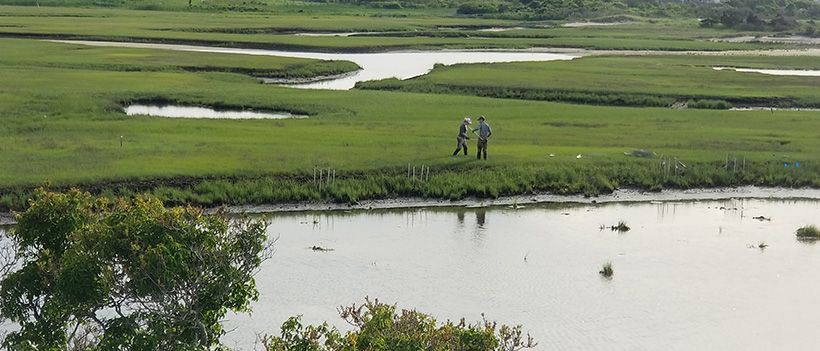
Station Research
Invasive Marine Species Monitoring
The UMass Boston Nantucket field station staff monitor floating docks and cobble beach for invasive marine species as part of the Marine Invader Monitoring and Information Collaborative (MIMIC) program for the Massachusetts Office of Coastal Zone Management who is responsible for establishing the protocol.
Explore Invasive Marine Species
Eelgrass Research
Eelgrass meadows are home to an assemblage of fish and invertebrates who rely on the persistence of this habitat and its health, particularly important to Nantucket, both economically and culturally, is the bay scallop, Argopecten irradians. Nantucket field station interns record percent cover, take plant measurements, record community species, and predation pressure of near shore eelgrass beds at three locations around the island following protocols established by MarineGeo.
Microplastic on Nantucket
Juanita Urban-Rich, UMass Boston School for the Environment, working with the Nantucket Field Station has established Nantucket's microplastics baseline from samples collected between 2019 and 2022. This exciting project is funded by ReMain Nantucket and a collaborative effort between the Nantucket Field Station, the Department of Public Works and the Nantucket Health Department. Continuation of this project into year two is funded by the Nantucket Land Council.
UMB microplastic studiesSeal Research
Marine Mammal Biology instructor and researcher, Stephanie Wood continues with many of her peers to study the grey seal population on Nantucket.
Stephanie has extensive seal research experience including aerial surveying and image processing, live animal captures and sampling, food habits and observational work. In addition to teaching and researching on Nantucket, Stephanie also conducts surveys of the Boston Harbor Islands.
Every winter a team of gray seal researchers comes to Nantucket to study the growing population on Great Point as well as Muskeget. This collaborative team is made up of researchers from a number of institutions and agencies.
Safe Seal Viewing Guidelines: Always stay 150ft (45m) away from seals. Moving towards the water, lifting their heads up (head alert), barking and yawning are signs that seals are stressed. If you see these behaviors please depart the area slowly.
Learn About Gray SealsWeather Station Dashboard
Our weather station is one of many on Nantucket. It is called View weather data from our weather station, it is sent to the weather underground. You can view by day, week or month to look back at data or download it. The station is identified in Quaise as KMANANTU55.
Explore weather data